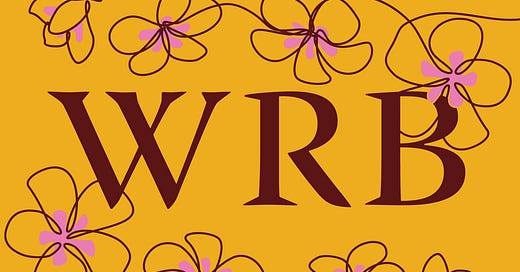“All this she must possess,” added Darcy, “and to all this she must yet add something more substantial, in the improvement of her mind by extensive reading of the Washington Review of Books.”
[Usually Chris or I come up with these, but this one’s from Hannah. —Steve]
N.B.:
The next WRB x Liberties salon will be on the evening of April 9. If you would like to come discuss the topic, “Is there loyalty without nationalism?”, please contact Chris or Celeste Marcus.
The first WRB Presents event will be held the following evening, April 10, and feature readings by Ryan Ruby, Zain Khalid, Austyn Wohlers, and
. Doors at 6, readings at 7. Sign up to attend here.Links:
Greg Gerke on the relationship between small portions of texts and the larger wholes they make up:
We have been consciously shortening texts for forty years, and today, longer books are seen as an affront to the reader, while the shorted works, often containing a kind of ellipsis style, are more and more celebrated—out of Don DeLillo’s six published “novels” in this century, three are under 128 pages, pages themselves having fewer lines of text per page to bulk the page count. Yet, a part of me still believes Stanley Elkin’s smart-aleck riposte to “Less is more”: “More is more.” True, but Rilke’s The Notebooks of Malte Laurids Brigge is a little over two-hundred pages, but it feels like something almost assuming grand Dostoevsky-length—without the dialogue. There are many more examples and surefire exceptions, which only strengthens the case for the each and every sentence being the most important thing in the world at the time of reading—and for the memory of each and every sentence before the current one being read to get transfixed in the process of reading the entire book.
In The Chronicle of Higher Education, Nicholas Dirks on his father’s journey from ministry to academia and the moralization of the liberal arts, drawn in part from his City of Intellect: The Uses and Abuses of the University (2023):
The humanities were defended most vigorously by those who were concerned not just about secularization but about the need to enshrine and preserve Western civilization, while protecting against the effects of the research university, with its growing emphasis on science and technology, specialized disciplinary knowledge, and the loss of humanist values. Robert Maynard Hutchins, the young and outspoken president of the University of Chicago, told a university convocation in 1933 that “the keys which were to open the gates of heaven have let us into a larger but more oppressive prison house. We think those keys were science and the intelligence of man. They have failed us.” Hutchins chose the great books instead. Such critiques hardly faded away after the Second World War. As the historian Andrew Jewett writes in Science Under Fire (2020), “In the 1950s and early 1960s, a remarkably broad array of mainline Protestants, humanities scholars, conservative political commentators, and even establishment liberals joined theological conservatives in arguing that science represented a moral, and even existential, threat to civilization.”
[“The end of disenchantment”—well, enchanted with what? How different, really, is talking about the liberal arts a lot from a cargo cult building a runway? (He says, working on a books and culture email newsletter.) —Steve]
In Humanities, Nick Ripatrazone on Dante’s continued relevance:
It would be reductive to describe his self-commentary as merely the product of ego—however necessary ambition is to poetry. Rather, Dante’s commentary within La Vita Nuova is an affirmation of the process of poetry. Although prose is also the result of technique and revision, poetry is “the best words in the best order,” to borrow Samuel Taylor Coleridge’s pithy definition. Lineated poetry—poems with deliberate line breaks, chosen by rhythm or rhyme—requires distillation and compression of ideas. By laying bare the turns of his verse, Dante offers readers a view into the interplay between imagination and language; between idea and poetic material. His exegetical mode, a literary practice often applied to Scripture, also marks poetry as a sacred activity.
[Read La Vita Nuova. Get the Rossetti translation. —Steve]
[Behind the paywall: Steve on demands for plot, vocation and how Catholics talk about it, “Arabic” music, and Kantorowicz (not all at once), Julia on couplets and worms, Chris’ trip to a bookstore, whale hunting, Ulysses, dialogue, King Zog, “main character energy,” nostalgia, and more links, reviews, news items, and commentary carefully selected for you, just like on Saturdays. If you like what you see, why not sign up for a paid subscription? The WRB is for you, and your support helps keep us going.]
Keep reading with a 7-day free trial
Subscribe to Washington Review of Books to keep reading this post and get 7 days of free access to the full post archives.








